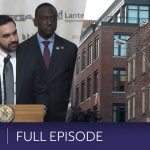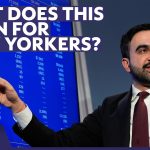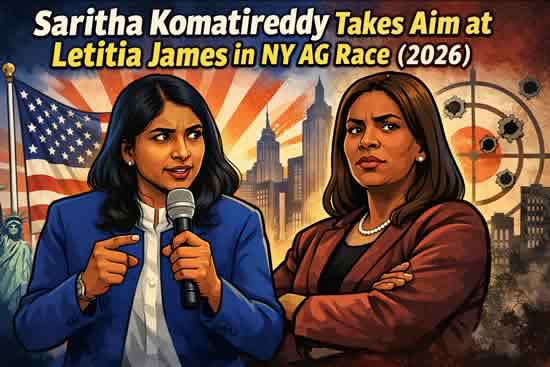Mona Davids: Welcome to Real Talk with Mona Davids. I want to say that I am extremely honored that today for my inaugural podcast of Real Talk with Mona Davids, that I am joined by the 110th mayor of the City of New York, our mayor, Mayor Eric Adams. Mayor Adams, thank you. Thank you for joining us today and having this conversation on this very important first podcast.
Mayor Eric Adams: Oh, thank you and congratulations. It’s so important to have “real talk.” I don’t believe we’re doing that enough nowadays and you can’t resolve issues if you’re not willing to have real conversations with them. So I’m really excited about your podcast and I hope that I’m a frequent guest.
Davids: I’m gonna hold you to that. I’m gonna hold you to that. You and your team and members of your administration, I hope that they’re gonna come and engage our audience and just, you know, real talk, straight answers, no spin, so that our communities can hear from this administration what’s going on and all the work that this administration is doing to uplift all New Yorkers.
So with that said, Mr. Mayor, look, we just finished the presidential election and the country gave our president-elect a mandate. And it wasn’t just the Midwest that gave him the mandate, just here in New York City. You know, we had a huge right shift with Americans voting for president-elect Trump.
So my question to you, mayor, how do you plan on working with president-elect Trump’s administration to address the top concerns of New Yorkers? Because clearly, with this right shift from the Bronx to Brooklyn, even in Manhattan, Queens, Staten Island, New Yorkers voted for Donald Trump. So clearly, they have concerns. How do you plan on addressing these concerns?
Mayor Adams: By number one, not warring with the president, but working with the president. I think that the worst thing you could do as a leader is after the election is over, you go into your separate corners and pout and talk about why your side didn’t win. There will only be one winner. And no matter who is the president, the ultimate winner should be the American people in general but specifically, for me, New Yorkers. And that’s why I made it clear.
I saw previous administrations when the president was in office that it was four straight years of battling and New York lost in the process. We can’t do that again. And from all of these important issues, from infrastructure to migrants and asylum seekers to criminal justice issues, all of these important issues, we need to zero in and communicate with the White House and say, New York needs help. We’re the largest city in America and I’m looking forward to getting that help from Washington, D.C. And this is his hometown. He’s a New Yorker. He grew up miles away from me in Queens so he knows how important this city is.
Davids: And I’m glad that you brought up, Mr. Mayor, just also talking about what’s top of so many people’s minds right now. And considering yesterday, this was the number one in the news cycle but the issue of the migrants and asylum seekers. And yesterday you met with our incoming border czar, the new head of ICE, Mr. Tom Homan. And following that meeting, you held an in-person briefing. And one of the things that you mentioned, Mr. Mayor, is that you’re exploring whether you may issue an executive order to allow our Police Department to allow law enforcement agencies to work with ICE. So could you please share a little bit more about whether or not you can, what’s the process, what are your thoughts and what’s your overall feeling from the meeting with Mr. Homan?
Mayor Adams: One, it was a good meeting. We shared ideas. Many of them we agree on and there’s some we don’t agree on and there’s nothing wrong with that. We knew the most important item and that’s safety. We should not be the victims of those who are seeking to come to this country. They should not violate the right to be here by carrying out dangerous, violent actions on fellow New Yorkers and on fellow migrants and asylum seekers. And we want to collaborate on how we address that population.
You’ve heard me say this long before the election was over, that that’s a problem for me and that is where I want to see if we could use executive orders to implement a plan that we could collaborate with ICE with those who commit violent crimes. And the team is looking at that to make a determination if it could happen and I’m hoping that we can. And the numerical minority that’s the loudest want to give you the impression that is not what every New Yorker wants. I speak to New Yorkers all the time.
New Yorkers don’t have a problem with immigrants, undocumented or undocumented. They have a problem with people not finding their way, people paying their way. Generations of immigrants that came here and they all found their way. No one gave anything out free. No one stated that you would get any special privileges. Everybody earned that back. That’s why we went to the 30 and 90 days program to say to the migrants and asylum seekers, you can’t stay here forever or taxpayers die. You have to find your way like every other group before you. And that small number that’s committing crimes, we’re saying to them, you’re welcome is no longer welcome here. We’re revoking that welcome because we’re not gonna allow you to inflict violence on citizens, non-citizens and other New Yorkers.
Davids: So Mr. Mayor, a question that many, many ask, especially in our community is what is the difference between the sanctuary city laws that we had, say 15, 20 years ago and what we have now?
Mayor Adams: And that’s a great question. What happened when Mayor Koch first did the sanctuary city laws, it was basically telling people who were here, documented or undocumented, he stated, you are paying taxes here.
You buy a loaf of bread, you’re paying taxes here. You decide to buy clothing for your children, you’re paying taxes here. You own property, you’re paying taxes here. He basically stated that you should not be afraid to receive the services that come from those taxes. You shouldn’t be afraid to have your children educated. You shouldn’t be afraid to go to the hospital if you need to be or if you’re a victim of a crime to call the police.
He says that you pay tax dollars and because you pay tax dollars, you have a right to get the services that your tax dollars are paying for. And Mayor Bloomberg also said the same thing. Under the previous administration, they went, I believe, too far. They stated that even if you’re here and you commit a violent act, we cannot collaborate with ICE to identify who you are. And I think that’s wrong. We should be able to identify with ICE and collaborate with ICE. And that’s the difference between the sanctuary city laws that Mayor Koch did many years ago and what was put in place under the previous administration.
Davids: Thank you. Thank you, mayor, for explaining that because, excuse me, a lot of New Yorkers are asking that question, like what’s the difference? Mayor, you also recently announced, or your administration recently announced the closure of Floyd Bennett Field as well as a number of other migrant shelters. And you mentioned the 30 to 60 day time limits. Do you see yourself even closing more shelters in, say, the next six months or so, or this is pretty much most of the shelters that your administration is gonna close?
Mayor Adams: Yes, we do. And it has nothing to do with the election. It has to do with the success of the administration. Deputy Mayor Williams-Isom was in charge of this, herculean task of dealing with 220,000 people that were sent to our city without any financial support from the national government. She was able to put in place an initiative that said you have 30 days for single adults, 60 days for families with children to find your way. That is what it’s supposed to be about.
And because of that success, we saw out of those 220,000, we saw 170,000 found their way. Some went back to their homeland, some went to the cities they always wanted to go to, and some did what every other undocumented immigrant did. They found their way. They got a job. They provided for their family. They may live in apartment of three, four families at a time, like many of us did.
When I came from Alabama, I stayed with my aunties and we moved around. You find your way in America and in New York. It’s not up to taxpayers to hold on or to provide for you for years and years and years. And so because we leaned into that, in spite of the criticism, we saw 170,000 people do what every other immigrant did, found their way.
Davids: Thank you. And Mr. Mayor, I just have one more question on this topic before I pivot to another topic. Mr. Mayor, one of the shocking things that you said yesterday, that I think shocked so many people is the fact that there are 500,000 children, migrant children, who are unaccounted for. And the video of you speaking about that has gone viral and has literally shocked the nation.
And Mr. Mayor, just here in New York City, or even in your conversations with Mr. Homan, as a former law enforcement person, like how would you tackle something like that? Like what can be done? Because we’re talking about a half a million children.
Mayor Adams: And think about that, Mona. You think about that. You know what I think about it when I see that number? I think of joy. I think of my son. If I were to send him to a country to find a better life, he has a sponsor here, then all of a sudden he disappears. You know what would be going through my head of wondering what is happening to him?
And so all these folks who are being so intellectual about this conversation, let’s deal with the real issue. We have a half a million children that we can’t account for. And no one seems to care. Are they being forced into sex workers? Are they being forced into child labor? Are they being abused? Where are they?
And so what I want to do is collaborate with ICE and collaborate the federal government so that we can do an analysis across the entire country to say what child is supposed to be in New York City. And let’s go after that sponsor. Let’s find them and say, where is this child? To see if that child is in harm’s way, if that child is in need of services. We can’t do it if we ignore the number and we just throw up our hands and say, okay, half a million children are here. We don’t know where they are. Let’s just forget about it because we can’t collaborate with ICE.
No. And you know what’s interesting, Mona? If we find that child and that child was being abused in any way, we could give them a visa to stay here and put them on a pathway to citizenship. So that’s what I’m talking about. And that is the type of collaboration that I believe we need to be doing.
Davids: Thank you for clarifying that, Mr. Mayor. And yeah, it is horrifying. Clearly child trafficking is real. So Mr. Mayor, I wanna pivot to a completely different topic, but it’s also top of mind for New Yorkers. The City Council just held a hearing on requiring licensing and registrations for e-bikes. So I’m really curious, what is your position on requiring licensing and registration for e-bikes?
Mayor Adams: I’m in support of the concept of any motorized vehicle on our streets. You should be able to identify the owner of it. And we have witnessed an explosion of e-bikes, three-wheel scooters, pedicabs, all of these other vehicles, ghost cars, because after COVID, people stopped using the subway system as much. We started the whole social distancing on our buses and they started using these micro-mobility methods.
Now we have to get it under control and it’s not under control right now. People are riding on sidewalks, running through red lights, going through crosswalks, and it has become a danger. And know who has been impacted the most?
Our older adults. I hear all the time at my older adults’ town halls that they talk about these micro-mobility vehicles that are extremely dangerous and it’s scary for them. And although we removed over 70,000 ghost cars and three-wheelers and two-wheelers off our streets, these guys are like the gremlins. The more you take one, another one comes back. And so we have to be consistent and I think identify who the owners are can only help us, not hurt us.
Davids: Well, thank you for sharing your position on this e-bikes issue. There were a lot of New Yorkers who testified in support of registering e-bikes and licensing them. Mr. Mayor, it’s December. It’s been quite a year. For next year, are you planning on rolling out some new policies, like any surprises for us?
Mayor Adams: Yeah, we have a lot of–
Davids: What are you looking forward to in 2025?
Mayor Adams: Just really having a productive year. This was a rewarding year, but it was challenging. All that one must deal with. And I think one should be judged not only about what they’ve done, but what they’ve overcome. And this administration had to overcome so much that we will continue to move forward. We have some real important initiatives that we are going to move forward come 2025 that’s gonna do what I’ve always done, focus on working class people.
Everything from what we’re doing around the removal of city income tax for anyone that makes 150 percent at or below poverty line, of what we have done with our foster care children, what we have done around reducing the [cost] of childcare in the city from $55 a week to less than $5 a week. You see administration that focus on working class people, and we have some new initiatives that we’re going to utilize in 2025 to continue to focus on working class people.
Davids: Wonderful. That’s great to hear, Mr. Mayor. Just want to wish you and your loved ones a happy Christmas, happy new year. And we hope to see you back here in 2025.
Mayor Adams: Often as I could be to update you. And again, congratulations to your show. You have been a real voice for so many New Yorkers, keep doing the great job you’re doing.
Davids: Thank you, Mr. Mayor. Thank you very much.
December 16, 2024
Source: NYC.gov, Midtown Tribune
Big New York news BigNY.com














